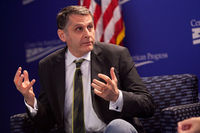Political Weakness Of The Secular Left In The United States
 From Conservapedia
From Conservapedia 
John J. DiIulio, Jr., Professor of Politics, Religion, and Civil Society at the University of Pennsylvania, wrote in the Claremont Review of Books about the political weakness of the secular left in the United States:
| “ | I would bet against traditional Democratic base voters getting steamrolled by Secularists, and I would bet the house on Americans remaining a predominantly religious people for decades to come. First, as Campbell, Layman, and Green note, “nonbelief in God” remains “a political nonstarter” in both parties. Indeed, the most loyal Democratic base constituency is black Americans, 97% of whom “believe in God or a higher power,” according to a March 2021 Pew report. So do 97% of all religiously affiliated adults and 72% of all religiously unaffiliated adults. Even major tragedies steeped in partisan politics do not shake most Americans’ faith. For example, a Pew report released in January 2021 indicated that, by a 7 to 1 margin, Americans who say their own faith has been strengthened as a result of the coronavirus outbreak (28%) outnumber those who say it has made their faith weaker (4%).
Second, the authors speculate about the “birth of a Secular Left analogous to the Religious Right,” but they have “reason to think that secularism will remain inchoate and thus politically ineffectual.” Amen, but only if the Democratic Party’s faith-friendly majority pushes back. In 2008, I joined clergy and other leaders, including other “pro-life, pro-family, and pro-poor” Democrats, as a speaker at the 2008 Democratic National Convention’s “Faith Caucus.” The ballroom was so full of people and energy that it scared the hell out of the convention’s anti-religious zealots. Unfortunately, those zealots currently hold sway in the party, and they made sure nothing similar happened again in 2012, 2016, or 2020. They also scrubbed all talk of God from the party’s platforms. But look for 2024 to be a year when the party’s more moderate and religious constituents have their say, show up, and pray out loud. Third, America’s religious individuals and institutions are enormously civic-minded in ways that tangibly benefit people of all faiths and none. In a 2001 report titled Better Together, I joined Harvard University’s Robert D. Putnam in documenting how the nation’s churches, synagogues, mosques, and other faith-based organizations “build and sustain more social capital…than any other type of institutions in America,” whether “measured by association memberships, philanthropy, or volunteering.” In stark contrast, as Secular Surge notes, Secularists and their organizations “specialize in politics”—in fact, Secularists do so little by way of “nonpolitical engagement” that the authors are obliged to caution against damning them as “civic deadbeats.”[2] |
” |
See also: Atheism and charity
Contents
- 1 Atheism and U.S. congressional politics
- 2 Religious right, Donald Trump and pro-religious rights U.S. Supreme Court judges appointed during the Trump Administration. Demoralization of American atheists.
- 3 Atheist activist Lee Moore: Donations to American atheist organizations are down due to infighting within the atheist movement
- 4 See also
- 5 References
Atheism and U.S. congressional politics[edit]
USA Today indicated in 2014:
| “ | Guess how many of the major-party candidates in next month's congressional elections are openly atheist. Hint: You can count them on one finger.
It tells you something that in a time when "no religion" is the category of roughly 20% of Americans, virtually none of the hundreds of Democrats and Republicans vying for congressional seats identify as a religious "none." .... atheism and related forms of non-belief are about the worst thing a candidate can be associated with.[3] |
” |
Religious right, Donald Trump and pro-religious rights U.S. Supreme Court judges appointed during the Trump Administration. Demoralization of American atheists.[edit]

The Religion News Service reported:
| “ | For the last decade, atheists, humanists and others secularists have worked hard to organize a “secular vote” that would counter the political clout of the religious right.
President-elect Donald J. Trump’s victory dealt that movement a body blow when he garnered 81 percent of the white evangelical vote and 60 percent of the white Catholic vote. Mormons, too, voted overwhelmingly for Trump. Despite Trump’s not being a particularly religious person, his platform was seen as anti-secular in many atheist and humanist circles. He said he would appoint religiously conservative Supreme Court justices, ban Muslim immigrants, favor Christianity and repeal the Johnson Amendment, which prohibits certain tax-exempt organizations from endorsing political candidates — issues antithetical to organized atheism and humanism.[4] |
” |
The U.S. Supreme Court Justice Brett Kavanaugh, who was appointed by Trump, is a judge who has ruled in favor of religious liberty in his past decisions.[5] U.S. Supreme Court Justice Neil Gorsuch, who was also nominated to the court by Trump, gave a favorable ruling in the Hobby Lobby case in respect to religious liberty.[6] Amy Coney Barrett is a religious, pro-life life U.S. Supreme Court judge appointed by Trump. See also: Morale of the atheist movement

At the American Atheists 2018 convention, David Silverman, ex-president of the American Atheists organization, gave a speech entitled, "How the mighty get back up". The speech alluded to the pro-religious rights agenda of the Trump administration (See: Donald Trump and American atheists). During the speech Silverman said regarding American atheists, "We are suffering a level of defeatism that I have never seen before". (See: Decline of the atheist movement).[7] Later in 2018, Silverman was fired due to allegations of financial conflicts and sexual assault (see also: Atheism and sexism).[8]
At the 2018 American Atheists convention, the ex-president of the American Atheist organization David Silverman declared:
| “ | It is a hard time to be an atheist activist. This has affected us. And it has affected our community...
...it has really affected us. We are suffering a level of defeatism that I have never seen before... We feel the loss. And we feel like we have lost. We feel like we lost the election... We see this cascade of attack coming down at us over and over from all different directions and we feel like it's over. I have heard so many times it makes me sick. It makes me sad. It feels like we lost. The apathy that follows. It doesn't matter. We can't win anyways. It's useless to fight. This apathy is infecting us. It's hurting us. And people are reacting to each other now. And so that is causing a division. Lots and lots of division in our movement. Hard, bad division... And that has resulted in a splintering and factioning of the movement that I have never seen before and none of us have. In other words, we're in a bad situation and it's getting worse.[9] |
” |
Atheist activist Lee Moore: Donations to American atheist organizations are down due to infighting within the atheist movement[edit]
See also: Atheist fundraising vs. religious fundraising and Atheist factions and Atheism and social skills
In 2017, the atheist activist Lee Moore declared about American atheist organizations:
| “ | If you look at the major atheist groups right now, like the national groups, the ones that are doing the real activist work... They are not bringing in the kind of donations they used to. Most of them are starved for cash. They're downsizing left and right. Because people aren't just giving like they used to. And I talked to a lot of the major donors out there and they said, "Well, we're kind of tired of seeing the atheist community just fight amongst itself and not really get anything done. We'd rather not give money if we don't think it's going to go somewhere."[10] | ” |
The 2017 IRS tax exempt form of the American Atheists organization shows that in 2016 the contributions and grants to the American Atheists organization was $1,160,208 and in 2017 contributions and grants to the American Atheists organization dropped to $408,922 (see: 2017 contributions and grants to American Atheists).[11][12]
See also[edit]
- Sociology of "atheism is un-American" view
- Decline of the secular left
- Distrust of atheists
- Views on atheists
References[edit]
- ↑ Berlinerblau, Jacques (February 4, 2011). "Obama at the National Prayer Breakfast". The Chronicle of Higher Education/Brainstorm blog. Retrieved on May 29, 2015.
- ↑ From Nuns to Nones: Americans will remain a religious people for decades to come. by John J. DiIulio, Claremont Review of Books, Fall of 2021
- ↑ Can atheists be elected? Column
- ↑ Dealt a body blow, atheists and humanists regroup by Kimberly Winston, Religion News Service, November 9, 2016
- ↑ These 6 Cases Show How Brett Kavanaugh Might Rule on Religious Freedom, Daily Signal, 2018
- ↑ Neil Gorsuch Has a Record of Protecting Religious Minorities, Time magazine, 2017
- ↑ David Silverman - How the Mighty Get Back Up
- ↑ This Firebrand Atheist Was Just Fired After Allegations Of Financial Conflicts And Sexual Assault
- ↑ David Silverman - How the Mighty Get Back Up
- ↑ Lee Moore and Steve Shives Talk About the Future of the Atheist Movement, - video quote comes 21 minutes and 13 seconds into the video
- ↑ 2017 IRS tax exempt form, American Atheists website
- ↑ Fundraising is way down for atheist organizations, Examining Atheism
Categories: [Secularism] [Atheism] [Liberalism]
↧ Download as ZWI file | Last modified: 03/05/2023 07:10:52 | 13 views
☰ Source: https://www.conservapedia.com/Political_weakness_of_the_secular_left_in_the_United_States | License: CC BY-SA 3.0
 ZWI signed:
ZWI signed: KSF
KSF